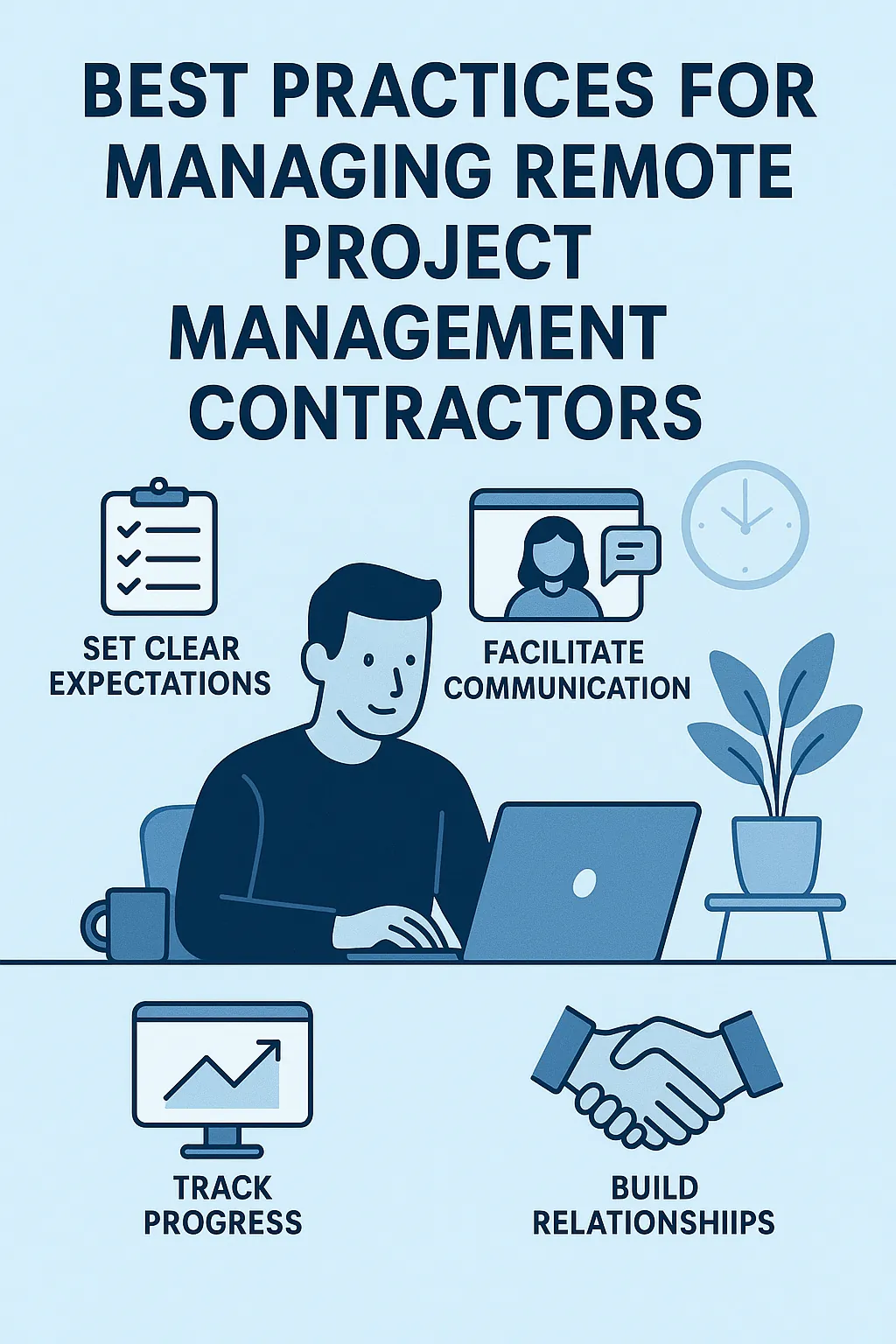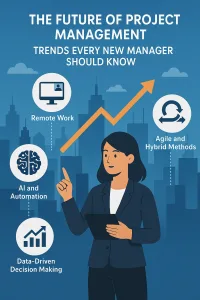Introduction
Project management contractors have become an integral part of many organizations. These professionals are typically hired on a temporary basis to oversee specific projects, bringing specialized skills and expertise that may not be available in-house. They play a crucial role in ensuring that projects are completed on time, within budget, and to the required quality standards. As businesses increasingly turn to project management contractors, understanding how to effectively manage these remote teams is essential for project success.
The rise of remote work has significantly transformed the landscape of project management. With advancements in technology and communication tools, teams can now collaborate from different geographical locations, breaking down traditional barriers. This shift has been accelerated by global events, such as the COVID-19 pandemic, which forced many organizations to adapt to remote operations. As a result, project managers must now navigate the complexities of leading teams that may never meet in person, requiring new strategies and approaches to ensure effective collaboration.
Effective collaboration is paramount in remote project management. When team members are dispersed, maintaining clear communication, fostering trust, and ensuring alignment on project goals can be challenging. Project managers must implement best practices that facilitate engagement and cooperation among remote contractors. This includes leveraging technology for seamless communication, establishing clear expectations, and creating a culture of accountability. By focusing on these strategies, project managers can enhance the productivity and effectiveness of their remote teams, ultimately leading to successful project outcomes.
Understanding Remote Project Management Contractors
Remote contractors have become an integral part of many teams. They bring specialized skills and flexibility that can enhance project outcomes. Here, we outline their responsibilities, the challenges they face, and the benefits of hiring them.
Responsibilities of Project Management Contractors
Remote project management contractors typically have a range of responsibilities that are crucial for the success of projects. These include:
- Project Planning and Coordination: They are responsible for developing project plans, defining project scope, and coordinating tasks among team members to ensure timely delivery.
- Resource Management: Contractors manage resources effectively, ensuring that the right skills are applied to the right tasks while optimizing the use of available resources.
- Stakeholder Communication: They act as a bridge between stakeholders and the project team, ensuring that all parties are informed and aligned on project goals and progress.
- Risk Management: Identifying potential risks and developing mitigation strategies is a key responsibility, helping to safeguard project timelines and deliverables.
- Performance Monitoring: Contractors track project performance against established metrics, making adjustments as necessary to keep the project on track [6][7].
Common Challenges Faced by Remote Contractors
While remote project management contractors offer significant advantages, they also encounter several challenges:
- Communication Barriers: Effective communication can be hindered by the lack of face-to-face interaction, leading to misunderstandings and misalignment on project objectives. This is particularly critical in remote settings where nuances can be lost [8].
- Time Zone Differences: Coordinating work across different time zones can complicate scheduling meetings and synchronizing tasks, potentially leading to delays in project timelines [6][8].
- Isolation: Remote contractors may experience feelings of isolation, which can impact their motivation and engagement with the project team. Regular check-ins and team-building activities can help mitigate this issue [1][4].
- Technology Dependence: Reliance on technology for communication and project management can lead to challenges if tools fail or if team members are not proficient in using them [5][9].
Benefits of Hiring Remote Contractors
Despite the challenges, there are numerous benefits to hiring remote project management contractors:
- Flexibility: Remote contractors often provide greater flexibility in terms of work hours and project engagement, allowing project managers to scale resources up or down as needed [6][7].
- Access to a Global Talent Pool: Hiring remotely opens up access to a diverse range of skills and expertise from around the world, enabling project managers to find the best fit for their specific project needs [5][6].
- Cost-Effectiveness: Engaging remote contractors can often be more cost-effective than hiring full-time employees, as it reduces overhead costs associated with office space and benefits [6][7].
- Diverse Perspectives: Remote contractors can bring unique insights and approaches to problem-solving, enhancing creativity and innovation within the project team [5][6].
Establishing Clear Communication Channels
Effective communication is the cornerstone of successful remote project management, especially when working with contractors. Here are some best practices to ensure that communication remains clear and productive:
- Identify Effective Communication Tools: Selecting the right tools is crucial for facilitating seamless communication among remote teams. Popular platforms such as Slack, Zoom, and Microsoft Teams offer various features that enhance collaboration. Slack provides instant messaging and channels for specific topics, while Zoom is ideal for video conferencing and virtual meetings. Microsoft Teams integrates with other Microsoft applications, making it a comprehensive solution for project management and communication [3][7].
- Encourage Regular Check-Ins and Status Updates: Regular check-ins are essential for maintaining open lines of communication between project managers and remote contractors. These meetings should be structured to not only discuss progress but also to address any challenges or roadblocks that may arise. Establishing a routine for these check-ins helps ensure that everyone stays aligned with project goals and timelines [4][5]. Additionally, status updates can be shared through project management software, which allows for real-time tracking of tasks and responsibilities [5].
- Set Expectations for Response Times and Availability: Clear expectations regarding response times and availability can significantly enhance communication efficiency. It is important to establish guidelines on how quickly team members should respond to messages and when they are expected to be available for discussions. This helps prevent misunderstandings and ensures that all team members are on the same page regarding communication norms [2][6]. By fostering a culture of accountability, project managers can create an environment where remote contractors feel supported and engaged.
Setting Clear Objectives and Deliverables
Establishing clear objectives and deliverables is crucial for guiding contractors effectively. This section will delve into the importance of well-defined goals and provide strategies to enhance collaboration among remote teams.
- Importance of SMART Goals: Utilizing the SMART criteria—Specific, Measurable, Achievable, Relevant, and Time-bound—ensures that project objectives are clear and actionable. Specific goals eliminate ambiguity, measurable goals allow for tracking progress, achievable goals set realistic expectations, relevant goals align with broader project aims, and time-bound goals create urgency. By implementing SMART goals, project managers can foster a focused approach that enhances productivity and accountability among remote contractors [10][14].
- Strategies for Outlining Project Deliverables and Timelines: Clearly outlining project deliverables involves defining what is expected from contractors at each stage of the project. This can be achieved by:
- Creating a Detailed Scope of Work: Begin every contractor relationship with a well-defined scope that outlines project goals, deliverables, and timelines in detail. This minimizes misunderstandings and sets a clear path for execution [15].
- Setting Clear Expectations: Clearly communicate who is accountable for each part of the project. This not only clarifies roles but also helps in tracking progress and ensuring that all team members are aligned with the project objectives [12].
- Utilizing Project Management Tools: Leverage digital tools that facilitate task assignment, deadline tracking, and progress monitoring. These tools can help maintain transparency and keep everyone informed about their responsibilities and timelines [10].
- Need for Flexibility and Adaptability in Project Planning: While having clear objectives is essential, it is equally important to remain flexible and adaptable. Remote projects can often encounter unforeseen challenges, and the ability to pivot when necessary can be a significant advantage. Project managers should:
- Encourage Open Communication: Foster an environment where contractors feel comfortable discussing challenges and suggesting adjustments to the project plan. This can lead to innovative solutions and improved collaboration [11].
- Regularly Review and Adjust Goals: Periodically assess the relevance of project goals and deliverables. If circumstances change, be prepared to adjust timelines and expectations to better align with the current project landscape [14].
By focusing on these strategies, project managers can effectively guide remote contractors, ensuring that projects are completed successfully and efficiently. Clear objectives, well-defined deliverables, and a flexible approach to planning are key components in fostering a productive remote work environment.
Fostering Team Collaboration and Engagement
Fostering a sense of team spirit among contractors is crucial for maintaining productivity and morale. Here are some effective strategies to enhance collaboration and engagement within remote teams:
1. Introduce Team-Building Activities
Team-building activities tailored for remote teams can significantly enhance camaraderie and trust among members. Consider the following options:
- Virtual Icebreakers: Start meetings with quick icebreaker questions to help team members get to know each other better. This can be as simple as sharing a fun fact or discussing personal interests.
- Online Games: Engage the team with online games or quizzes that promote teamwork and friendly competition. Platforms like Kahoot! or Jackbox Games can be great for this purpose.
- Regular Check-Ins: Schedule informal catch-up sessions where team members can share updates, challenges, and successes. This helps in building relationships and fostering open communication.
2. Utilize Collaborative Tools
The right tools can make a significant difference in enhancing teamwork among remote contractors. Here are some effective collaborative tools:
- Project Management Software: Tools like Trello and Asana allow teams to organize tasks, set deadlines, and track progress in a visually appealing way. This transparency helps team members stay aligned and accountable.
- Communication Platforms: Utilize instant messaging and video conferencing tools such as Slack or Zoom to facilitate real-time communication. These platforms can help bridge the gap created by physical distance and encourage spontaneous discussions.
- Document Sharing: Use cloud-based services like Google Drive or Dropbox for sharing documents and resources. This ensures that all team members have access to the latest information and can collaborate effectively on projects.
3. Recognize and Celebrate Achievements
Acknowledging the hard work and accomplishments of remote contractors is vital for maintaining motivation and engagement. Here are some ways to celebrate achievements:
- Shout-Outs in Meetings: Take time during team meetings to recognize individual contributions and celebrate milestones. This public acknowledgment can boost morale and encourage others to strive for excellence.
- Virtual Awards: Consider implementing a virtual awards system where team members can nominate each other for various categories, such as “Most Innovative Idea” or “Best Team Player.” This fosters a culture of appreciation and recognition.
- Celebrate Project Milestones: Organize virtual celebrations or send small tokens of appreciation when significant project milestones are reached. This not only recognizes the team’s hard work but also reinforces a sense of shared success.
By implementing these strategies, project managers and team leaders can create a collaborative and engaging environment for remote project management contractors. This not only enhances productivity but also fosters a strong sense of team spirit, which is essential for the success of any project.
Monitoring Progress and Performance
Effectively managing remote project management contractors requires a strategic approach to monitoring their progress and performance. Here are some best practices that project managers and team leaders can implement to ensure successful collaboration and productivity.
1. Establish Key Performance Indicators (KPIs)
Setting clear and measurable KPIs is essential for tracking the performance of remote contractors. These indicators should align with the project’s objectives and provide a quantifiable way to assess progress. Consider the following:
- Define Specific Metrics: Identify metrics that reflect the contractor’s responsibilities, such as task completion rates, quality of work, and adherence to deadlines.
- Regularly Review KPIs: Schedule periodic reviews to evaluate performance against these indicators. This helps in identifying areas for improvement and recognizing achievements.
2. Conduct Regular Feedback Sessions
Regular feedback sessions are crucial for maintaining open communication and ensuring that contractors are aligned with project goals. Implement the following strategies:
- Schedule Weekly Check-ins: Use these sessions to discuss progress, address challenges, and provide guidance. This fosters a collaborative environment and keeps everyone on the same page.
- Encourage Two-Way Feedback: Create a culture where contractors feel comfortable sharing their insights and concerns. This can lead to improved processes and stronger team dynamics.
3. Utilize Project Management Software
Leveraging project management software can significantly enhance the tracking of remote contractors’ work. Here are some benefits:
- Task Management: Use tools that allow for task assignment, tracking, and deadline management. This provides visibility into who is responsible for what and helps in monitoring completion rates.
- Real-Time Updates: Many project management platforms offer real-time updates on task status, enabling project managers to quickly identify bottlenecks and adjust plans as necessary.
4. Provide Constructive Feedback and Support
Constructive feedback is vital for the growth and development of remote contractors. Consider these approaches:
- Be Specific and Actionable: When providing feedback, focus on specific behaviors or outcomes rather than generalizations. This helps contractors understand what they need to improve.
- Offer Support and Resources: Ensure that contractors have access to the necessary resources and support to succeed. This could include training, tools, or additional personnel to assist with workload.
By implementing these strategies, project managers and team leaders can effectively monitor the progress and performance of remote project management contractors, fostering a productive and collaborative work environment.
Building Trust and Accountability
establishing a strong foundation of trust and accountability with contractors is essential for successful collaboration. Here are some best practices to foster these critical elements:
Importance of Transparency and Honesty
- Open Communication: Transparent processes are vital for building trust within remote teams. Regular updates and open lines of communication help create a sense of connection and ensure that all team members are aligned with project goals and expectations. This includes sharing project schedules, deadlines, and any changes that may arise during the project lifecycle [4][9].
- Clear Workflows: Clearly defining workflows and decision-making procedures can enhance transparency. When contractors understand the processes and expectations, they are more likely to feel secure in their roles and responsibilities, which fosters a trusting environment [4].
Techniques for Fostering Accountability
- Set Clear Expectations: Establishing clear expectations from the outset is crucial. This includes defining roles, responsibilities, and performance metrics. When contractors know what is expected of them, they are more likely to take ownership of their tasks and deliver results [5][7].
- Regular Check-Ins: Implementing regular check-ins and status updates can help maintain accountability. These meetings provide opportunities for contractors to discuss their progress, address challenges, and receive feedback. This not only keeps everyone on track but also reinforces a culture of accountability [9].
- Encourage Feedback: Creating an environment where feedback is encouraged can enhance accountability. Contractors should feel comfortable sharing their thoughts and concerns, which can lead to improved processes and outcomes. Open communication fosters a sense of responsibility among team members [7].
Benefits of Empowering Contractors with Autonomy
- Increased Motivation: Empowering contractors with autonomy can lead to increased motivation and job satisfaction. When contractors are given the freedom to make decisions and manage their tasks, they are more likely to take pride in their work and strive for excellence [8].
- Enhanced Creativity: Autonomy allows contractors to explore innovative solutions and approaches to their work. This can lead to improved problem-solving and creativity, ultimately benefiting the project as a whole [8].
- Stronger Relationships: When contractors feel trusted and empowered, it strengthens the relationship between them and project managers. This mutual respect fosters a collaborative environment where team members are more likely to support one another and work towards common goals [6].
Navigating Time Zone Differences
Managing remote project management contractors can be particularly challenging due to the complexities introduced by different time zones. Here are some best practices to effectively navigate these challenges and enhance collaboration within your remote team.
Importance of Scheduling Meetings
When working with a geographically dispersed team, scheduling meetings requires careful consideration of time zone differences. Here are some strategies to ensure effective meeting planning:
- Use a Shared Calendar: Implement a shared calendar that displays all team members’ time zones. This transparency helps everyone understand when others are available, reducing the likelihood of scheduling conflicts.
- Rotate Meeting Times: To ensure fairness, rotate meeting times to accommodate different time zones. This practice allows all team members to participate at reasonable hours, fostering inclusivity and engagement.
- Set Clear Agendas: Distribute meeting agendas in advance, allowing team members to prepare regardless of their time zone. This practice maximizes productivity during the meeting and respects everyone’s time.
Tools for Time Zone Management
Utilizing the right tools can significantly ease the burden of managing time zone differences. Here are a couple of recommended tools:
- World Time Buddy: This tool allows users to compare time zones across different locations easily. It provides a visual representation of time differences, making it simple to find suitable meeting times.
- Every Time Zone: A straightforward tool that displays the current time in various time zones, helping teams quickly identify overlapping working hours. This can be particularly useful for scheduling meetings or deadlines.
Encouraging Asynchronous Communication
Asynchronous communication is vital for accommodating varying schedules and ensuring that all team members can contribute effectively. Here are some strategies to promote this approach:
- Utilize Project Management Tools: Platforms like Trello, Asana, or Monday.com allow team members to update their progress and communicate without needing to be online simultaneously. This flexibility enables everyone to work at their own pace while staying aligned with project goals.
- Record Meetings: For those who cannot attend live meetings, consider recording sessions and sharing them with the team. This practice ensures that everyone has access to the information discussed and can follow up with questions or comments at their convenience.
- Set Clear Expectations: Clearly define response times for communications and project updates. This clarity helps team members understand when they can expect feedback and encourages them to manage their time effectively.
By implementing these strategies, project managers and team leaders can effectively navigate the challenges posed by time zone differences, fostering a collaborative and productive remote work environment.
Conclusion
In today’s increasingly digital landscape, managing remote project management contractors effectively is crucial for the success of any project. Throughout this blog post, we have explored several best practices that can enhance collaboration and productivity among remote teams. Here’s a recap of the key points discussed:
- Clear Communication: Establishing robust communication channels is essential. Regular check-ins and updates help ensure that everyone is aligned and aware of project developments [2][8].
- Setting Clear Expectations: Clearly defining roles, responsibilities, and project goals from the outset can prevent misunderstandings and keep the team focused on their objectives [4][7].
- Utilizing the Right Tools: Leveraging project management software and collaboration tools can streamline workflows and facilitate better coordination among team members [3][8].
- Fostering Team Engagement: Creating a team atmosphere, even in a remote setting, is vital. Engaging team members through virtual team-building activities can enhance morale and collaboration [1][2].
- Regular Feedback and Support: Providing constructive feedback and support helps contractors feel valued and encourages continuous improvement [2][8].
As project managers and team leaders, adopting a proactive approach to managing remote contractors is essential. By implementing these strategies, you can create a more cohesive and productive remote team environment.
Find out more about Shaun Stoltz https://www.shaunstoltz.com/about/.
This post was written by an AI and reviewed/edited by a human.



